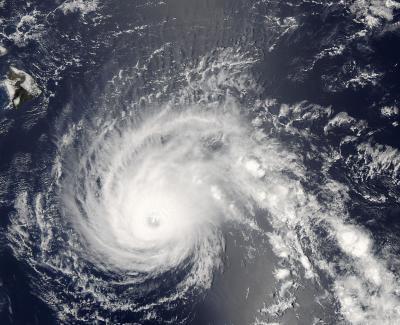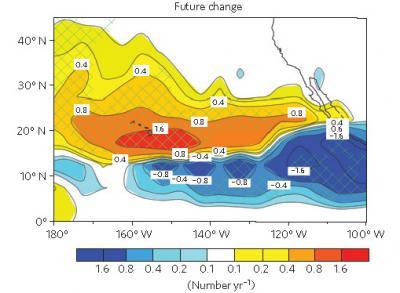News of a hurricane threat sends our hearts racing, glues us to the Internet for updates, and makes us rush to the store to stock up on staples. Hawaii, fortunately, has been largely free from these violent storms in the recent past, only two having made landfall in more than 30 years.
Now a study headed by a team of scientists at the International Pacific Research Center, University of Hawaii at Manoa, shows that Hawaii could see a two-to-three-fold increase in tropical cyclones by the last quarter of this century. The study, which appears in the May 5, 2013, online issue of Nature Climate Change, though, leaves open the question, how worried Island residents should get.
"Computer models run with global warming scenarios generally project a decrease in tropical cyclones worldwide. This, though, may not be what will happen with local communities," says lead author Hiroyuki Murakami.
To determine whether tropical cyclones will become more frequent in Hawaii with climate change, Murakami and climate expert Bin Wang at the Meteorology Department, University of Hawaii at Manoa, joined forces with Akio Kitoh at the Meteorological Research Institute and the University of Tsukuba in Japan. The scientists compared in a state-of-the-art, high-resolution global climate model the recent history of tropical cyclones in the North Pacific with a future (2075–2099) scenario, under which greenhouse gas emissions continue to rise, resulting in temperatures about 2°C higher than today.

Hurricane Flossie is approaching the Big Island of Hawaii in August 2007.
(Photo Credit: NASA)
"In our study, we looked at all tropical cyclones, which range in intensity from tropical storms to full-blown category 5 hurricanes. From 1979 to 2003, both observational records and our model document that only every four years on average did a tropical cyclone come near Hawaii. Our projections for the end of this century show a two-to-three-fold increase for this region," explains Murakami.
The main factors responsible for the increase are changes in the large-scale moisture conditions, the flow patterns in the wind, and in surface temperature patterns stemming from global warming.
Most hurricanes that might threaten Hawaii now are born in the eastern Pacific, south of the Baja California Peninsula. From June through November the ingredients there are just right for tropical cyclone formation, with warm ocean temperatures, lots of moisture, and weak vertical wind shear. But during the storms' long journey across the 3000 miles to Hawaii, they usually fizzle out due to dry conditions over the subtropical central Pacific and the wind shear from the westerly subtropical jet.
Surprisingly, even though fewer tropical cyclones will form in the eastern Pacific in Murakami's future scenario, we can expect more of them to make their way to Hawaii.
The upper-level westerly subtropical jet will move poleward so that the mean steering flow becomes easterly. Thus, storms from Baja California are much more likely to make it to Hawaii. Furthermore, since the climate models also project that the equatorial central Pacific will heat up, conditions may become more favorable for hurricane formation in the open ocean to the south or southeast of Hawaii.
"Our finding that more tropical cyclones will approach Hawaii as Earth continues to warm is fairly robust because we ran our experiments with different model versions and under varying conditions. The yearly number we project, however, still remains very low," reassures study co-author Wang.

This image shows the projected change in number of tropical cyclones per year by the last quarter of this century. The green stippling indicates statistical significance at the 99 percent confidence level.
(Photo Credit: Hiroyuki Murakami, Nature Climate Change)
Source: University of Hawaii ‑ SOEST